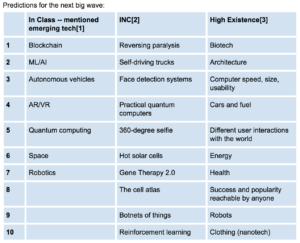What’s the Next Big Wave?

We entered the Digital Age in the mid 1900s during which we have been hit by rapid waves of innovation about every decade. If you notice that everyone’s heads are bowed down peering into a hand-sized block of technology, it’s glaringly clear that the most recent advance was in mobile tech. The more enticing question that venture capitalists, entrepreneurs, government and society ponders is what the next big wave will be.
We’ve established an increasingly powerful tech foundation built upon computers. The next steps lie in integrating such technology even more into our lives, whether by making something more efficient, useful, or immersive. Ultimately, we hope to ease some pains of life and/or introduce new forms of convenience and joy. However, what exactly it will be isn’t easy to predict. As James Quinn states in his Harvard Business Review article[4], it’s impossible to forecast exactly what technology will infiltrate our lives and how. It’s more of a matter of developing models to predict the likelihood of certain technology being adopted based on existing societal wants and needs. That is most probably why partners at Sequoia, as stated by guest speaker Carl Escheban, try to invest in innovations across various industries from transportation to health since it’s hard to tell which one will actually succeed.
Despite the uncertainty, there is a similar theme across predictions for what the next wave will entail. They involve faster computing, increased autonomy, improved health and smarter environmental management. What makes this point in time most fascinating is the plethora of candidates for the next wave and even the potential for the next advance to be a tsunami created by wide adoption of several innovations at once. Now that computers are well established and steadily improving, people are sprouting out to create a myriad of ways to apply this fundamental technology. However, I’d argue it’s unlikely that all of the predicted technologies in the table above will come true nor quickly.
So which of those applications will come first, if ever? Perhaps autonomy will. The need statement for other predicted innovations like health is strikingly clear and great, but health may take more time given the slower nature of health-related research as well as necessary careful and rigorous regulation. On the other hand, autonomy through machine learning and artificial intelligence has garnered so much hype in the tech community, bringing in talent and excitement rapidly into the field. Furthermore, the process by which AI/ML is worked upon is much more rapid than that of health as computer models can be run day and night, constantly improving and learning without rest. Aside from the technical standpoint, the applications for autonomy are easy to understand — robots that can do tasks for us, self-driving cars, voice assistants — things that even before Siri or Alexa were already somewhat familiar to mankind through mainstream media like Ironman’s Jarvis. As stated in class, autonomy is not so much a product of itself like a personal computer, but something that is integrated into other products. In fact, it is already being leveraged by companies that are widely used by society and therefore, is almost inevitable that at some point in a daily routine, people will have come to use some form of autonomous computing. But we can never be sure until after the fact that we’ve been hit by the wave and we retrospectively compare how things have changed. Until then, we’ll just have to keep riding the waves looking out to oncoming tides.
Sources:
[1]-Carl Escheban from Sequoia, guest speaker for MS&E238 on Fri 6/29/2018
[2]-https://www.inc.com/jessica-stillman/10-breakthrough-technologies-that-are-about-to-change-the-world.html
[3]-http://highexistence.com/10-ways-the-next-10-years-are-going-to-be-mind-blowing/
[4]-https://hbr.org/1967/03/technological-forecasting
Users who have LIKED this post:

